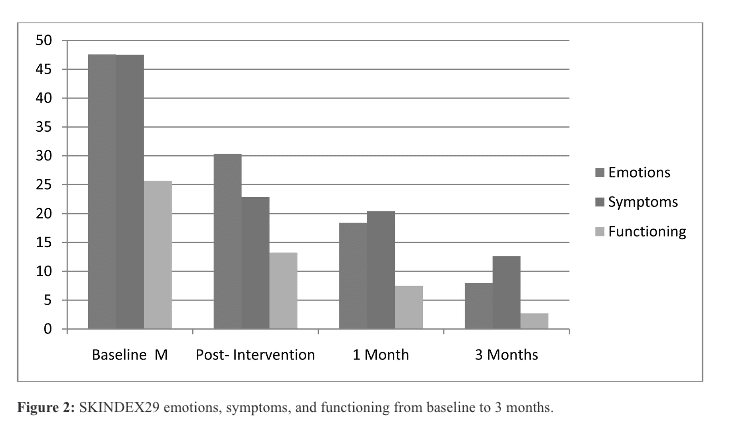Do you believe in the mind-body connection? This research study goes below the surface (of the skin, that is) to find out.
Most of us have had some recognizable experience with our emotions causing a physical response in our bodies. Maybe you get headaches just before your in-laws come to visit, or perhaps you’ve had digestive problems when conflicts arise at work.
Scientific evidence continues to mount, demonstrating that our thoughts and emotions play a huge role in our physical wellness. Psoriasis is one particular example of the interplay between the mind and the body.
Many psoriasis patients associate a particular trauma or stress with the beginning of their disease and accompanying physical symptoms. Most connect a worsening of symptoms with anxious or depressed periods. And research has shown that psoriasis patients who are obsessed with worry actually do worse in treatment.
Psoriasis: Not Just Skin-Deep
 So what exactly is psoriasis? According to the National Psoriasis Foundation, it’s a complex autoimmune illness with many symptoms.
So what exactly is psoriasis? According to the National Psoriasis Foundation, it’s a complex autoimmune illness with many symptoms.
Patients develop itchy and painful dry red patches and lesions, often on the knees, elbows, and head. There are psychological symptoms as well, including anxiety, depression, catastrophizing, avoidance of activity, and emotional reactivity. These often trigger more itching, scratching, and a reduced quality of life.
Psoriasis is often misunderstood as a simple rash, whereas it’s actually a very serious illness. Patients are often limited in what they can do and can even lose connection with their community and family as a result.
It's also particularly dangerous because it’s associated with other illnesses including heart disease, diabetes, obesity, arthritis, cancer, and Crohn’s disease.
Psoriasis is the most common autoimmune disease in the U.S., and is not only serious, it’s also extremely costly. Researchers of this study I’m about to describe cited a figure of $11.25 billion dollars spent annually on psoriasis health care expenditures and lost income. Wow!
A Disease in Search of a Cure
Psoriasis is difficult to treat; currently, there’s no cure. Sure, there are many different medications prescribed by doctors, but their effectiveness is questionable, and they often have serious side effects.
Doctors presently use phototherapy, cyclosporine and methotrexate (both of which are known carcinogens).
However, there was one previous study that had measurable positive results using an alternative modality: mindfulness meditation. There was a significantly faster rate of skin clearing than in a control group who just received the phototherapy treatments. This was a big clue to researchers that the mind had a bigger role to play in both the development of, and cure for, the disease.
Knowing both about the meditation study and about the successes of Emotional Freedom Techniques in other conditions involving anxiety and depression, researchers wanted to see what effect Tapping would have on psoriasis patients.
What Happened in This Study
This study had two goals: 1) to introduce patients to EFT and educate them about the practice; and 2) to see if the practice had an impact on patients’ symptoms.
Researchers recruited 12 individuals with psoriasis (eight men and four women). 30% had had psoriasis for 10 years or more and half had three or more outbreaks in the previous year. All but one had skin lesions. Only 33% believed it was possible to be free of psoriasis, and all had psychological difficulties, including anxiety and depression.
They were given a battery of symptom charts that measured both psychological and physical symptoms. Then, the individuals learned about Emotional Freedom Techniques in a six-hour workshop and were told to use Tapping as part of their daily routine. After the workshop, they filled out the symptom charts again.
One month later, researchers called each participant to check-in and to go through the symptom charts a third time. Three months later, researchers called and reviewed the symptom charts for the last time.
In general, the results showed that the Emotional Freedom Technique led to a significant decrease in symptoms and an increase in psychological well-being.
Like other EFT studies, this one showed that the lessening of symptoms was either maintained over time or lessened even further with time.

Here are just a few of the responses that participants gave at their 3-month follow-up phone call:
“It’s amazing! I’ve been to the beach. I’m wearing shorts!”
“I’m more focused now than ever.”
“It’s been amazing.”
“I’m so happy, I’m not getting any flare ups.”
“Lesions almost all gone... don’t need as many treatments.”
Considering how wide-spread and serious psoriasis is, I hope to see this very promising research followed-up with more studies with more diverse and larger numbers of participants.
And remember, we have a whole program designed to bring healing from autoimmune disorders to your body. The results we’ve heard from those who have completed the program have been incredible!
EFT is easy to learn and in this study, we can see the way the mind and body heal together. It’s also very encouraging in terms of potential application to other serious, long-term chronic illnesses that affect a huge portion of the population.
Until next time,
Keep Tapping!
Nick Ortner
What do you think about the mind-body connection? Do you have any personal stories to share? I'd love to read them below. :)
Tapping for Psoriasis – Research Points to Irritation Relief was first seen on: http://tappingsolution.com
No comments:
Post a Comment